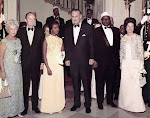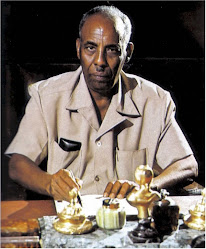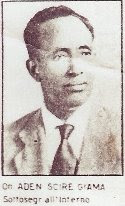The British Government have signed protection treaties with six Somaliland tribes: Gadabursi, Eesa,Warsangeli, Habr Gerhajis, Habr Toljaala and Habr-Awal.
All the Articles in the Agreements and the Supplementary Agreements signed with the Somaliland tribes are similar except the Warsangali one.
The only treaty singed by Garad[or traditional leader] representing the all tribe is the Warsangali one. All
the other treaties are singed by elders that may represent their areas or their different sub-clans.
–The Warsangali treaty doesn’t contain the preamble that precedes every treaty which puts the independence
and maintenance of order in the British Government hands. The statement goes as “the maintenance of our
independence , the preservation of order …… ” . The Warsangali treaty is added an extra article [LOOK ARTICLE VI OF THE WARSANGALI TREATY] that none of the other treaties has which indicates that the Warsnagali will assist the British officers and followtheir advice for ” .. duties as my be assigned to them, and further act upon their advice in matters relating to the administration of justice, the development of the resources of the country, the interests of commerce, or in any other matter in relation to peace, order, and good government, and the
general progress of civilization. “
–No tribal area is referred as “COUNTRY” except the
Warsangali territory.
ARTICLES I, II and III are removed from the Warsangali Treaty. ARTICLE III in the Warsnagali Treaty is
similar to ARTICLE II in HABR GERHAJIS and Habr Toljaala Treaty but it is removed the statement ” All
vessels under the British flag shall have free permission to trade at all ports and places within …
“
The conclusion of every agreement, except the WARSANGALI TREATY, indicates that the treaty will be
abided by the elders currently signing and ” their heirs and successors “
“The Dhulbahanta tribe associated themselves with Dervish, English Cavalry, King Osman, but mostly remained in the country of the Warsangeli Tribe, that is why Dhulbahante did not part of the negotiations.”
HERE ARE THE ARTICLES THAT ALL THE OTHER TRIBES HAVE EXCEPT THE WARSANGALI TREATY
____________ _________ _________ _________ _________ _________ _________ _________ _________ _
We, the undersigned Elders of the Gadabursi tribe, are desirous of entering into an Agreement with the
British Government for the maintenance of our independence, the preservation of order, and other
good and sufficient reasons. Now it is hereby agreed and covenanted as follows:-
ART. I. The Gababursi tribe do hereby declare thatthey are pledged and bound never to cede, sell,mortgage, or otherwise give for occupation, save tothe British Government, any portion of the territorypresently inhabited by them, or being under their control.
ART. II. All vessels under the British flag shall havefree permission to trade at all ports and places within the territories of the Gadabursi tribe
ART. III. All British subjects residing in or visiting the territories of the Gadabursi tribe shall enjoy perfect safety and protection, and shall be entitledto travel all over the said limits under the safe-conduct of the Elders of the tribe
………… .
In token of the conclusion of this lawful and honourable bond, Jama Roblay, ……..and Major Frederick Mercer Hunter, Assistant Political Resident at Aden, the former for themselves, their heirs and successors, and the latter on behalf of the British Government, do each and all, in the presence of witnesses, affix their signatures, marks, and seals, at Zaila, on the 11th day of December, 1884, corresponding with the 25th Safar. F. M. Hunter
(the marks of Elders named.) Agreement with the Gadabursi, ZAILA, Dec. 11, 1884 -
____________ _________ _________ _________
We, the undersigned Elders of the Eesa tribe, are Desirous of entering into an Agreement with the British Government for the maintenance of our ndependence, the preservation of order, and other good and sufficient reasons.
Now it is hereby agreed and covenanted as follows:-
ART. I. The Eesa tribe do hereby declare that they are
pledged and bound never to cede, sell, mortgage, or
otherwise give for occupation, save to the British
Government, any portion of the territory presently
inhabited by them, or being under their control.
ART. II. All vessels under the British flag shall have
free permission to trade at all ports and places
within the territories of the Eesa tribe
ART. III. All British subjects residing in or visiting
the territories of the Eesa tribe shall enjoy perfect
safety and protection, and shall be entitled to travel
all over the said limits under the safe-conduct of the
Elders of the tribe
…….
In token of the conclusion of this lawful and
honourable bond, Ali Geridone, ………and Major Frederick Mercer
Hunter, Assistant Political Resident at Aden, the
former for themselves, their heirs and successors, and
the latter on behalf of the British Government, do
each and all, in the presence of witnesses, affix
their signatures, marks, and seals, at Zaila, on the
31st day of December, 1884, corresponding with the
13th Rabu-al-Awal, 1302
F. M. Hunter
Agreement with the Eesa Somal, ZAILA, Dec. 31, 1884 –
____________ _________ _________ _________
We, the undersigned Elders of the Habr Toljaala tribe,
are desirous of entering into an Agreement with the
British Government for the maintenance of our
independence, the preservation of order, and other
good and sufficient reasons.
Now it is hereby agreed and covenanted as follows:-
ART. I. The Habr Toljaala tribe declare that they are
pledged and bound never to cede, sell, mortgage, or
otherwise give for occupation, save to the British
Government, any portion of the territory presently
inhabited by them, or being under their control.
ART. II. All vessels under the British flag shall have
free permission to trade at all ports and places
within the territories of the Habr Toljaala, and the
tribe is bound to render assistance to any vessel,
whether British or belonging to any other nation, that
may be wrecked on the above-mentioned shores, and to
protect the crew, the passengers, and cargo of such
vessels, giving speedy intimation to the Resident at
Aden of the circumstances, for which act of friendship
and good-will a suitable reward will be given by the
British Government.
ART. III. All British subjects residing in or visiting
the territories of the Habr Toljaala shall enjoy
perfect safety and protection, and shall be entitled
to travel all over the said limits under the
safe-conduct of the Elders of the tribe
In token of the conclusion of this lawful and
honourable bond, Dirir Shaikh Don, ….[INSERT THE
NAMES OF THE ELDERS HERE]…..;and Major Frederick
Mercer Hunter, Assistant Political Resident, the
former for themselves, their heirs and successors, and
the latter on behalf of the British Government, do
each and all, in the presence of witnesses, affix
their signatures, marks, and seals, at Aden, on the
26th day of December, 1884, corresponding with the 9th
of Rabu-al-Awal, 1302
F. M. Hunter
(the marks of Elders named.)
Agreement with Habr Toljaala, Aden, December 26,1884
____________ _________ _________ _________
We, the undersigned Elders of the Habr Gerhajis tribe,
are desirous of entering into an Agreement with the
British Government for the maintenance of our
independence, the preservation of order, and other
good and sufficient reasons.
Now it is hereby agreed and covenanted as follows:-
ART. I. The Habr Gerhajis tribe do hereby declare that
they are pledged and bound never to cede, sell,
mortgage, or otherwise give for occupation, save to
the British Government, any portion of the territory
presently inhabited by them, or being under their
control.
ART. II. All vessels under the British flag shall have
free permission to trade at all ports and places
within the territories of the Habr Gerhajis, and the
tribe is bound to render assistance to any vessel,
whether British or belonging to any other nation, that
may be wrecked on the above-mentioned shores, and to
protect the crew, the passengers, and cargo of such
vessels, giving speedy intimation to the Resident at
Aden of the circumstances, for which act of friendship
and good-will a suitable reward will be given by the
British Government.
ART. III. All British subjects residing in or visiting
the territories of the Habra Gerhajis tribe shall
enjoy perfect safety and protection, and shall be
entitled to travel all over the said limits under the
safe-conduct of the Elders of the tribe
In token of the conclusion of this lawful and
honourable bond, Ahmed Ali, ……..and Major Frederick Mercer
Hunter, Assistant Political Resident at Aden, the
former for themselves, their heirs and successors, and
the latter on behalf of the British Government, do
each and all, in the presence of witnesses, affix
their signatures, marks, and seals, at Aden, on the
13th day of December, 1885, corresponding with the
28th of Rabi-al-Awal, 1302
F. M. Hunter
(Signatures of Elders)
Agreement with Habr Gerhajis, Aden, January 13,1885
____________ _________ _________ _________
WHEREAS the garrisons of His Highness the Khedive are
about to be withdrawn from Berbera and Bulhar, and the
Somali Coast generally, we, the undersigned Elders of
the Habr-Awal tribe, are desirous of entering into an
Agreement with the British Government for the
maintenance of our independence, the preservation of
order, and other good and sufficient reasons.
Now it is hereby agreed and covenanted as follows:-
ART. I. The Habr-Awal tribe do hereby declare that
they are pledged and bound never to cede, sell,
mortgage, or otherwise give for occupation, save to
the British Government, any portion of the territory
presently inhabited by them, or being under their
control.
ART. II. All vessels under the British flag shall have
free permission to trade at the ports of Berbera,
Bulhar, and other places in the territories of the
Habr-Awal tribe
ART. III. All British subjects residing in or visiting
the territories of the Habr-Awal shall enjoy perfect
safety and protection, and shall be entitled to travel
all over the said limits under the safe-conduct of the
Elders of the tribe
……
In token of the conclusion of this lawful and
honourable bond, Abdellah Liban, ……..and Major Frederick Mercer
Hunter, the officiating Political Resident of Aden,
the former for themselves, their heirs and successors,
and the latter on behalf of the British Government, do
each and all, in the presence of witnesses, affix
their signatures, marks, and seals, at Berbera, on the
21st day Ramdhan, 1301, corresponding with the 14th
July, 1884
F. M. Hunter, Major,
Officiating Political Resident, Aden.
Agreement with Habr-Awal, Berbera, July 14, 1884
____________ _________ _________ _________
The conclusion of every agreement, except the
WARSANGALI TREATY, indicates that the treaty will be
abided by the elders currently signing and ” their
heirs and successors “
____________ _________ _________ _________
TREATIES, &c., between the Warsangalis (British
Protection; Slave Trade; Wrecks: &c.). – January 27,
1886
THE British Government and the Elders of the
Warsangali tribe who have signed this Agreement being
desirous of maintaining and strengthening the
relations of peace and friendship existing between
them;
The British Government have named and appointed
Major Frederick Mercer Hunter, C.S.I., Political Agent
and Consul for the Somali Coast, to conclude a Treaty
for this purpose.
The said Major F. M. Hunter, C.S.I., Political
Agent and Consul for the Somali Coast, and the said
Elders of the Warsangali, have agreed upon and
concluded the following articles:-
ART. I. The British government, in compliance with the
wish of the undersigned Elders of the Warsangali,
undertakes to extend to them and to the territories
under their authorities and jurisdiction the gracious
favour and protection of Her Majesty the
Queen-Empress.
II. The said Elders of the Warsangali agree and
promise to refrain from entering into any
correspondence, Agreement, or Treaty with any foreign
nation or Power, except with the knowledge and
sanction of Her Majesty’s Government.
III. The Warsnagali are bound to render assistance to
any vessel, whether British or belonging to any other
nation, that may be wrecked on the shores under their
jurisdiction and control , and to protect the crew,
passengers, and cargo of such vessels, giving speedy
intimation to the Resident at Aden of the
circumstances; for which act of friendship and
good-will a suitable reward will be given by the
British Government.
IV. The Traffic in slaves throughout the territories
of the Warsangali shall cease for ever, and the
Commander of any of Her Majesty’s vessels, or any
other British officer duly authorized, shall have the
power of requiring the surrender of any slave, and of
supporting the demand by force of arms by land and
sea.
V. The British Government shall have the power to
appoint an Agent or Agents to reside in the
territories of the Warsangali, and every such Agent
shall be treated with respect and consideration, and
be entitled to have for this protection such guard as
the British Government deem sufficient.
VI. The Warsangali hereby engage to assist all British
officers in the execution of such duties as may be
assigned to them, and further to act upon their advice
in matters relating to the administration of justice,
the development of the resources of the country, the
interests of commerce, or in any other matter in
relation to peace , order, and good government, and
the general progress of civilization.
VII. This Treaty to come into operation from the 27th
day of January, 1886, on which date it was signed at
Bunder Gori by the Undermentioned.
F. M. Hunter
Witness:
J. H. Raintier, Commander, R. N.
Muhammad Mahmud Ali, Gerad of all the Warsangali.
Jama Mahmud, Gerad
Muhammad Ibrahim, ditto.
Omar Ahmed, ditto.
Mahmud Abdullah, ditto.
Yussuf Mahmud, ditto.
Of the Ayal Fatih sub-tribe-
Nur Abdullah.
Isa Adan.
Muhammad Ali Shirwa.
Abdy Nur
Of the Ogais Lebay sub-tribe–
Muhammad Abdy Nalaya.
Mahmud Sagullay.
Abdullah Sagullay.
Muhammad Abdullah












![A picture posted to a Twitter account that purports to speak on behalf of
Omar Hammami attempts to show that he is still alive, despite rumours to the
contrary. [File/Sabahi]](http://sabahionline.com/shared/images/2013/01/15/amriki-jan-2013-340_227.jpg)



.jpg)










